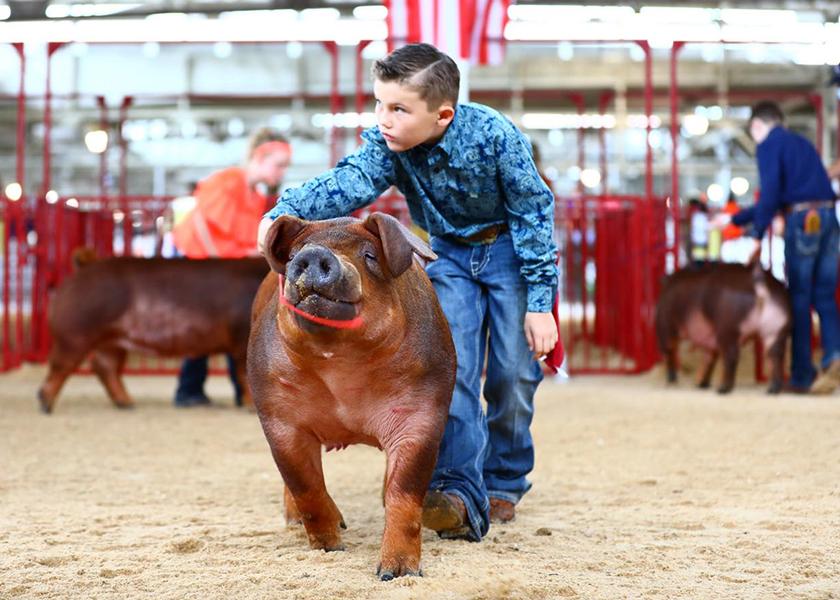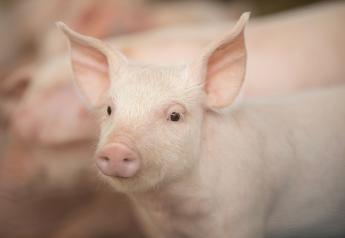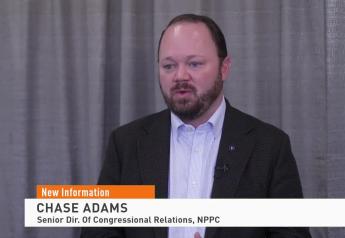It Starts With You: Biosecurity Reminders for Youth Swine Shows

Regardless of whether you sell 100,000 markets hogs a year or have a barn with two show pigs, Jan Archer, a pig farmer from Wayne County, N.C., says we all share an obligation to take care of each other. And that starts with biosecurity.
Never before has the importance of biosecurity hit home with so many people as it does today. As COVID-19 ravages throughout the country in the human population, Archer encourages swine producers to think about how that virus parallels with porcine epidemic diarrhea virus (PEDV).
PEDV is caused by a coronavirus. It only infects pigs and was first confirmed in the U.S. in May 2013. Although PED acts differently in the pig as compared to novel coronavirus in humans, both are highly contagious and easy to spread, Archer points out.
“The pork industry, including kids who show pigs, have made incredible changes in their biosecurity efforts and how seriously they take the spread of diseases like PED,” Archer says. “I think we can take a page from that book as we’re dealing with it now on the human end with COVID-19.”
As the youth livestock show season ramps up in Oklahoma and other southern states, reports are that PEDV is rearing its ugly head more, too.
Dr. Lisa Becton, director of swine health information and research at the National Pork Board, says biosecurity doesn’t have to be expensive and complicated. It comes down to a few basics and an overall understanding of your pig. Here are a few tips to keep your animals healthy this show season.
1. Before the Show
Nobody wants to miss a show, but if your pig is sick, it’s your responsibility to stay home. Call your veterinarian and keep your pigs at home until they recover from their illness.
If your pigs are healthy and you plan to attend a show, clean and disinfect your show box, equipment and truck and trailer before leaving for the show. It’s important to clean, disinfect and dry all equipment that you may use. The National Pork Board encourages youth to use disinfectants according to label instructions and solicit parent help.
2. During the Show
Keep your pen area clean at the show. Don’t share equipment with other exhibitors – if you need to help someone with their pig, use one of their whips and respective equipment.
Just like you would do at home, monitor your pigs closely for any signs of illness while you are at the show. Report any illness to the veterinarian on-call.
Wash your hands often with soap and running water before and after you have contact with animals. If soap and water are not available, use an alcohol-based hand sanitizer.
3. After the Show
When you get home from the show, quarantine your pigs and watch for signs of illness. Clean and disinfect your trailer and all equipment, especially feed pans and show boxes. Remember to communicate, says Daniel Hendrickson, DVM.
“If you see something, say something. Communicate with your veterinarian if you notice any signs of health concerns,” Hendrickson says.
Also, don’t let any teachable moments pass you by, he adds. Teach others what you’ve learned if your pig gets sick and share how you’ve handled the situation. The more we help each other, the better off everyone will be.
Biosecurity is not just a good idea, it’s absolutely critical to ensure a future filled with opportunities for young people to have the life-changing experience of showing a pig.
“We are all on one team,” says Benny Mote, a swine Extension specialist for University of Nebraska-Lincoln. “The industry needs the youth – we’re going to keep asking you to do the right thing, keep working on biosecurity and listen to the leaders before you.”
Archer says it’s important for youth exhibitors to remember the six ethical We Care principles that drive the pork business. Those principles don’t change, she emphasizes, regardless of how many pigs you raise.
“Part of taking care of your community and your friends and your neighbors is making sure that you're not bringing them anything that's going to injure them, their animals or their families,” Archer says. “That's our obligation, as neighbors and friends in our community, and as producers, is to take care of each other. All those things that you do to practice biosecurity, they're not only to prevent to protect you, they're mostly to protect everybody else.”
Read more:
Breaking Down Biosecurity: Youth Exhibitors Know Their Role Matters
Perspectives in Progress Panel Takes a Stand on Biosecurity
Glitter Snot and Virus Swapping: Hands-on Biosecurity Practice







